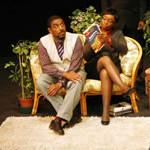By Mark Grey
The Greenwich Playhouse
In a week where government cuts are being announced left, right and centre, it’s no new idea to suggest that the true value of things is under intense scrutiny – perhaps more so now than for a long while. In all honesty, I can’t say whether the arts have been more or less vocal than others but, either way, proponents making the case for art are always cropping up.
While this in no way discredits the arguments themselves, most are as old as art itself: in both practitioners and audiences, the arts are said to increase social consciousness and responsibility, self-realisation, morality, and generally promote a challenging of attitudes in the hope of creating more enlightened and complete citizens. All with a healthy sprinkling of cathartic release. They have an immaterial value, hence the difficulty in proving their worth to people whose minds are on budgets.
Yet it’s often reductively implied that these values of art exist solely in the form and content of what’s being communicated; that you can only find them in the poem, in the music, or in the painting.
When I watched When No One Is Watching by Agape Theatre Company, I re-discovered an often-ignored recess where the value of art also lurks. It concerns the act of making it. It exists in the elemental human endeavour of trying to create and express – irrespective of subject matter.
Tucked away above a Greenwich pub last week, nine actors got up to perform in front of eight people. The house seats over 60. There was no famous playwright on sale: the play was written by Mark Grey, who also directs and acts in the show. Leafing through the programme, there are no big sponsors nor is there support from public trusts. There is no all-star cast, but rather an unlikely assortment of performers with a variety of backgrounds, professional lives and interests. And in the audience, there were three friends in their early 20s, two senior citizens, a lone middle-aged Asian man, my date and myself.
According to conventional theatrical standards, this sounds like a disaster.
And yet there we were: 17 strangers willingly shut away in an almost empty room for a couple of hours. That’s the only way I can describe it. People, who would otherwise barely notice each other on the street, came together and hung out for an evening. And the stark intimacy of the Greenwich Playhouse meant there was no hiding from each other – actors and audience members alike, despite an imaginary fourth-wall, were all inescapably aware of and in communion with each other. We were all genuinely participating in the same thing.
That evening, I was re-introduced to theatre in a primal sense. There was nothing elitist or phoney about this. I was astounded by the clarity of the definition of theatre I was witnessing: one group came together, got up and told their story for another group to enjoy. And with 8 people in the audience, you’re hardly up there to show-off to an agent or casting director. You have no choice but to act for this particular audience as they sit in front of you – nothing more, nothing less. And the sincerity, simplicity and downright humanness of that was as valuable to me as any experience I’ve had in the theatre.
Now, are there areas of improvement for the script, direction and acting? Of course. When aren’t there? But I felt more like a ‘real’ theatre-goer with Agape than I do falling into rank and marching to my seat among the robotic army of money that comprises audiences at larger London theatres. I felt more ‘human’ in their company, more essential to the event, and not like some intellectual, detached judging-machine. There was something immediate and pure about their desire to communicate and perform, despite the inevitable pang they must have felt from low attendance. I felt like I was beginning to understand the primaeval impulse that gave rise to theatre in the first place.
This company shows that there is just as much to glean from the making of art and theatre as there is from the work of art itself. They created their own opportunity; they made their own play; they told their own story; and they did so in a way and in an environment that achieved an all-too rare sense of collectivity among a bunch of individuals. There was more that was true to what theatre can and should be in that humble space than I’d come across for a long time. Theatre is a spirit in people to come together, to make things happen, and to share with others. Agape has that in buckets. And, thankfully, that’s something the government can’t ‘cut’.
When No One Is Watching
by Mark Grey
Agape Theatre Company
Greenwich Playhouse – Outer London
Until 31 October 2010
Tue-Sat 19:30. Sun 16:00
£12.00
http://www.galleontheatre.co.uk/
(The Greenwich Playhouse)




